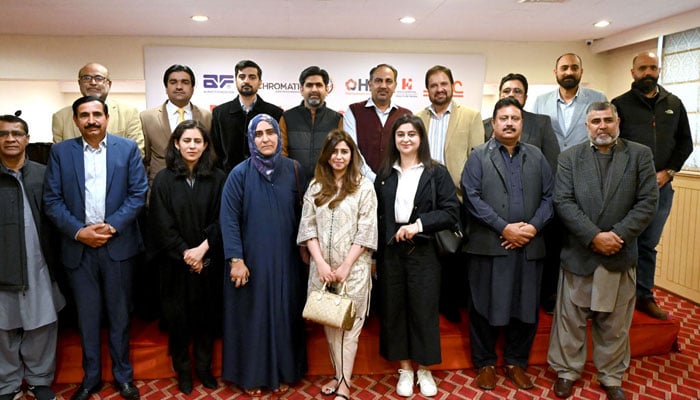Experts demand for FED increase on tobacco to help economy
Islamabad: The Society for the Protection of the Rights of the Child (SPARC) advocates 26 per cent FED increase on cigarettes to bridge the gap between health burden and tax revenue.
Muhammad Sabir, Principal Economist at the Social Policy and Development Centre (SPDC), shared the recommendations at an event organised to launch a tobacco taxation simulation model published by the Social Policy and Development Centre (SPDC), says a press release.
The event attended by leading healthcare activists, called for a Tobacco Tax Hike in 2024 to recover healthcare costs and save lives. Sabir said that Pakistan presently operates with a two-tiered Federal Excise Duty (FED) structure for cigarettes, categorized by price tiers.
Following a substantial increase in 2022-23, the FED share in retail prices reached 48% and 68% for low and high tiers, respectively. However, the levelling off of the FED share in 2023-24, due to the absence of rate adjustments, could adversely affect revenue and public health efforts. Sabir added that a proposed 26.6% FED increase in 2024 could recoup 19.8% of the costs, narrowing the gap between health burdens and tax revenues. A 26.6% FED hike could potentially lead to 517,000 fewer smokers, a 12.1% increase in tax revenue, and a 19.8% recovery of health costs.
Beyond 2023-24, the government should integrate cost recovery into tobacco tax policies through automatic adjustments, implement a uniform FED rate across all cigarette brands, and prescribe tax increases for the next three years. Dr. Ziauddin Islam, Former Technical Head, Tobacco Control Cell, Ministry of National Health Services and Regulations and Coordination, stated that recent statistics reveal that in Pakistan, 31.9 million adults aged 15 years and above, approximately 19.7% of the adult population, are current tobacco users. The use of tobacco leads to over 160,000 deaths annually in Pakistan, amounting to 1.4% of the nation’s GDP each year. It is imperative to revitalize Pakistan’s cigarette taxation system.
Dr. Khalil Ahmad Dogar, Program Manager at SPARC, said that the suggested tax hike promises a clear ‘win-win’ situation for both health and revenue for the government and the people of Pakistan. New governments shouldn’t fall into any tricks of the tobacco industry. Civil society will support the government in debunking any myths propagated by the tobacco industry. Concerns about illicit trade have been countered by research showing that tobacco companies manipulate reported production to influence tax policies and evade taxes.
-
 PayPal Data Breach Exposed Sensitive User Data For Six-month Period; What You Need To Know
PayPal Data Breach Exposed Sensitive User Data For Six-month Period; What You Need To Know -
 Prince William Receives First Heartbreaking News After Andrew Arrest
Prince William Receives First Heartbreaking News After Andrew Arrest -
 11-year-old Allegedly Kills Father Over Confiscated Nintendo Switch
11-year-old Allegedly Kills Father Over Confiscated Nintendo Switch -
 Jacob Elordi Talks About Filming Steamy Scenes With Margot Robbie In 'Wuthering Heights'
Jacob Elordi Talks About Filming Steamy Scenes With Margot Robbie In 'Wuthering Heights' -
 Why Prince Harry Really Wants To Reconcile With King Charles, Prince William, Kate Middleton?
Why Prince Harry Really Wants To Reconcile With King Charles, Prince William, Kate Middleton? -
 'Grief Is Cruel': Kelly Osbourne Offers Glimpse Into Hidden Pain Over Rockstar Father Ozzy Death
'Grief Is Cruel': Kelly Osbourne Offers Glimpse Into Hidden Pain Over Rockstar Father Ozzy Death -
 Timothée Chalamet Reveals Rare Impact Of Not Attending Acting School On Career
Timothée Chalamet Reveals Rare Impact Of Not Attending Acting School On Career -
 Liza Minnelli Gets Candid About Her Struggles With Substance Abuse Post Death Of Mum Judy Garland
Liza Minnelli Gets Candid About Her Struggles With Substance Abuse Post Death Of Mum Judy Garland -
 'Saturday Night Live' Star Will Forte Reveals How He Feels About Returning To The Show After 2010 Exit
'Saturday Night Live' Star Will Forte Reveals How He Feels About Returning To The Show After 2010 Exit -
 Police Officer Arrested Over Alleged Assault Hours After Oath-taking
Police Officer Arrested Over Alleged Assault Hours After Oath-taking -
 Maxwell Seeks To Block Further Release Of Epstein Files, Calls Law ‘unconstitutional’
Maxwell Seeks To Block Further Release Of Epstein Files, Calls Law ‘unconstitutional’ -
 Prince William Issues 'ultimatum' To Queen Camilla As Monarchy Is In 'delicate Phase'
Prince William Issues 'ultimatum' To Queen Camilla As Monarchy Is In 'delicate Phase' -
 Winter Olympics 2026: Remembering The Most Unforgettable, Heartwarming Stories
Winter Olympics 2026: Remembering The Most Unforgettable, Heartwarming Stories -
 King Charles Hands All Of Andrew Mountbatten-Windsor’s Records And Files To Police: Report
King Charles Hands All Of Andrew Mountbatten-Windsor’s Records And Files To Police: Report -
 Eric Dane's Family Shares Heartbreaking Statement After His Death
Eric Dane's Family Shares Heartbreaking Statement After His Death -
 Samsung Brings Perplexity AI To Galaxy S26 With ‘Hey Plex’ Voice Command
Samsung Brings Perplexity AI To Galaxy S26 With ‘Hey Plex’ Voice Command




